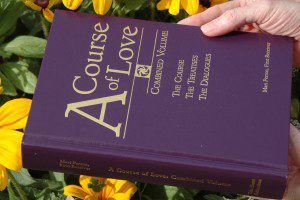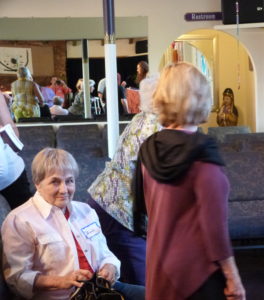 Who you are is love, and all things brought to love are seen in a new light, a light that keeps what you would learn to help you remember who you are, and in that remembrance transforms the rest, leaving you with nothing to be ashamed of, nothing to keep hidden, leaving you with nothing but the truth of who you are. C:31.20
Who you are is love, and all things brought to love are seen in a new light, a light that keeps what you would learn to help you remember who you are, and in that remembrance transforms the rest, leaving you with nothing to be ashamed of, nothing to keep hidden, leaving you with nothing but the truth of who you are. C:31.20
Your remembrance of the Christ-Self has abolished the ego-self and allows us to begin the lessons of the personal self. T3:1.13
Our freedom comes in release of the burden of not being who we are, the burden of the dictator ego, the declaration of our independence from it, or even better, our acceptance that it does not now and never did exist in truth.
While spending the day with ACOL reader/receivers in Sedona I felt a desire to face the belief in (or continuing acceptance of the existence of) the ego head on. I have spoken of this before, but never in a way of, “Let’s look at this.” In my preamble to the topic I spoke of meeting so many truly loving people who’ve read ACOL many times, and still speak of “their” ego—and so the suggestion—“Let’s talk about it.”
My challenge came in a way I didn’t expect—in a quite thoughtful suggestion that the ego can be befriended. I don’t remember word-for-word what I said in response, but it was the closest I know of to any statement I’ve made that might be considered dogmatic. I said something along the lines of this being an understandable idea psychologically, but that with the definition of ego given us in ACOL and the action we’re asked to take, this is not the call.
“According to A Course of Love.” Yikes!

I’ve gone a long time without saying, “According to A Course of Love.” According to A Course of Love/according to Jesus … this is the way … that is not the way. Surely, any way we loosen the ego’s hold on us is valuable. I could have said that. But I didn’t.
It was just after lunch when I suggested opening this conversation. We’d had the most lovely morning, but now it was afternoon.
I looked out at people in their “after lunch” slump, the bright enthusiasm of the morning dimmed, and probably in part due to my own discomfort in having said, “According to A Course of Love,” I moved us on and away from the whole subject before too long. A woman asked me a question about it later that I said I’d respond to by email. The question was, “How do I get rid of the ego?”
What an amazing thing that I had never been asked this question before. And that I had no idea how to answer it. I don’t know that I ever even thought of it in those terms. It had always felt to me that with the embrace of love and acceptance of truth, the letting go happened of its own. I have spoken of it mainly because I’ve felt that people judge their feelings and the thoughts that they deem negative as “ego,” and so the idea remains that until a certain perfection is reached, the ego is still part of their identity. I am really very good at encouraging acceptance of all feelings as feelings of love as we proceed, through The Dialogues, and our dialogues, as egoless selves. But the question of ego remains.
I could cite all kinds of quotes from ACOL on the topic, some that could be read as arguments against the ego, many that are appeals to accept the truth, few or none that specifically state a “how to” even while the whole of it offers many ways to acceptance. I found my acceptance in the felt experience of love and the uniting of mind and heart—the coming of wholeheartedness. When the heart and mind come together, judging and comparing one self (ego self) to the other (true Self), a “right self” to a “wrong self” begins to meet its end. These judgments that were carried so easily from ourselves to situations and relationships, quiet down. As within/so without.
In finding this unity within, the “righting” of all that prevented us from being who we truly are begins. These things are often challenging and even conflict inducing. Feelings of anger or sadness, grief or depression may arise…feelings needing room to be felt, expressed and healed. There may be calls to Self-empowerment seen as self-defense. Emergent Self-love might be seen as thinking too highly of oneself or being selfish. There may be much confusion about all this at first. How can I feel this way? Yet it is love (not ego) that lets us turn confusion into clarity. We are “already there” and being held in the embrace that heals us into wholeness. 
Who you are is love.
What happens first? An end to judgment? Or the advent of self-love? See what I mean? It’s all about love. In accepting love, the heart’s patterns begin to take the lead and you and I begin to see who we truly are. That is it really, the end of the ego. Yes, we’re told that some of the patterns “of the ego’s thought system” may remain for a while, but not “the ego” which is likened (in C:9.31 ) to “an imaginary friend.” Friend or foe, the ego is not real. It’s not “who” we are, and ceasing to identify with it is the way it meets its end, and is the end of having two selves. As much as love is crucial, the end of a “two-self” idea is crucial as well. The “first unity” is unity within. The “first unity” allows the acceptance of all that is and all that is yet to come, and the rejection of all that never was and never will be.
In this current election period, (as much as I hate to mention it) we’ve been seeing a crystal-clear demonstration of what happens when there are two sides doing battle. Love’s call is a call to no more battles. Love’s call is a call of unity. It won’t be seen “out there” until it is seen and accepted “in here.”
Each of you has had an imprisoned personal self. Each of you who have entered Christ-consciousness has had the cell door and the prison gate thrown open and a new world offered. If you do not “accept” this opportunity, you remain incarcerated in a system that tells you when you will awaken, how you will spend your day and when you will retire. You remain at the mercy of those who are incarcerated along with you. You remain at the mercy of those who would have power over you, and you remain subject to the laws of man. D4.5
Each of us can choose love’s freedom, the freedom of having one true Self, of living by the laws of Love, and of being able to be distinctly who we are within unity.


Ben, Thank you for your interest in this blog and this question. The only thing is, is that to the person questioning, it was not asked as a trick question. I know that sometimes that can happen, but it was not the case with this person. I knew that, and still didn’t know how to answer. For those who cut their spiritual teeth on ACIM, the ego is so huge. I recall in the early days of sharing ACOL how it was seen as hubris to claim that you might have shed the ego. Who would dare to do so when that was the case? The changes since then are incredible, and I feel great hope that those coming to ACOL now will “dare” to let the whole idea of an ego “self” get washed away.
Thank you Mari
I like so much what you always share about the human and divine together its something so relaxing in this, no hiding, no pretending.
It feels true for me… This is the New…
And Yes its freeing when we can speak from the heart… Thank you so much for your reply…
It felt good for me
What a marvelous blog! Here is my take on “The question was, “How do I get rid of the ego?” This , in fact, is a trick-“question”, a hidden persuader! It is not a question at all, but rather a statement that affirms ego (or the ego) exists…now tell me how to get rid of ego. It is one of those “wrong” questions….like a circular philosophical conundrum.
Attempts to answer that question will keep us in the prison of D4.5 ….. I guess that C31.20 holds the “answer”: Who you are is Love. ….
(I hope this is “in truth”, and not dogma…)
Dear Mari
Opening facebook this morning your post was up and went straight to my heart together with a beautiful picture.
Many thoughts and feelings has arisen in me the last weeks due to circimstances in my life but also the communication in the ACOL group.
I was trying to find a quote in ACOL yesterday that summaraized my latest insight and experience that its all love and so is everyone… So seeing your post related so much to this.
This morning I was thinking of You Mari and of Christina and how you too so beautifully are showing us what dialogue can be in a true heartful sense, well at least for me…
Your combination of being humble, sharing of yourself and your own journey, listening and really see the jewel in what everyone shares and at the same time sharing your wisdom and love is precious for me.
Lately I have seen more clearly that what often feels not comfortable for me is when someone reaches out with grief, anger or strong feelings at least the way I perceive it… But I have also come to see that this is exactly what I do sometimes and judge myself hard for… So seeing this pattern mirrored in others is a blessing that helps me to embrace that aspect in me more and see it as a call for love in me and others… And by embracing this disowned part of me it allows me to be in my strenght and actually stand up more for what I believe in, stand of for love and true… So in that way all is good.
The other way of communicating that does not feel so good for me is when someone takes the role of a teacher too much, hiding their own challenges and only wanting to share the “good”. If it comes from someone that seem to be just in a state of love and peace all the time its totally fine, but when it comes from others that I sense still have their own struggle it would feel so much more honest and real to get to know a little bit more about them.and their own journey… And even in this case I am the same, many times I “prefer” even though not consciously to share only my way of coming to peace and feeling love… .And so I see that this is also a call for love in me, wanting to be good and feeling peace. And also I can see that could honour my own wisdom and share more of my love and truth too.
The friends I most have in my own life are somewhere in between… I would call it the good dialogue where we are honest, sharing in vulnerability and true whats going on in our life, and where we also share our wisdom and love for each other… It gives me a feeling of unity, closeness, being One.
But until I have come to fully accept myself as love I will be disturbed by people mirroring this other parts of me that I have not truly embraced and that still are trying to get love in ways that I do not always feel comfortable with.. My latest insight that has gotten deeper is that its all a call for love and my answer can be to embrace myself and others, feeling compassion and love instead of trying to push away… Yesterday I had a beautiful experience of this and thanks to everyone and everything that has happened I could experience myself being true to love in a new way and in a certain situation… and that felt so good.
Thank you Mari for being you…
This may not be totally relating to what you wrote but it is what came up in me and part of my latest insights and journey…
Love Anne
Hi Anne,
Thank you for being you too! I love this part of what you said: “by embracing this disowned part of me it allows me to be in my strenght and actually stand up more for what I believe in, stand of for love and true…”. Thank you for speaking of this, of your discomfort, and what you’re coming to see. It’s not easy for me either at times, but I do really, really like and appreciate it when people stand in their truth and share what they feel. There is such a release of fear, isn’t there, when you feel you can speak from your heart? And especially when can say what you need to say in your own natural way? I am so held by that desire to see the human and divine together, in all the diverse ways that happens, without loftiness or pretense. ACOL is particularly thorough in the way it doesn’t let us hide behind anything, including our “spirituality” in our coming into wholeness. It is a way to come to strength, and I hadn’t really thought of it in that way…so I appreciate your words very much.
Thank you Mari for dealing with this crucial subject.
Indeed a long as we keep believing in the ego, we give him existence or reality. This is the supposed ego’s last shelter: Beliefs. Once the belief truly gone, the things that we believed in can’t stand very long.
This whole world is based on false beliefs. I had written a text on this subject a few days ago. I will post it now. Even if it may sound ‘dogmatic’.
Love,
Oh the dreaded “dogma.” It is interesting, isn’t it Jacques? I love Jesus’ call to turn away from dogma and to turn toward the sharing of who we are. This practice takes so many challenging topics out of the theoretical arena and into the area of life and of living wholeheartedly. I agree that it’s difficult to talk of some subjects without speaking in ways that suggest “one truth” and this is probably the biggest one. To leave behind the false for the true. Especially our false ideas about ourselves. And as for the world? When we turn toward the truth of our Selves, I find it nothing short of miraculous that we can move past belief to ideas and to creation of the new. We’re offered so many ways of leaving “the old” behind. It’s not always easy, but it can always be done with a little willingness.